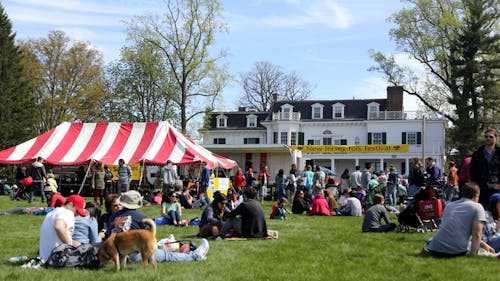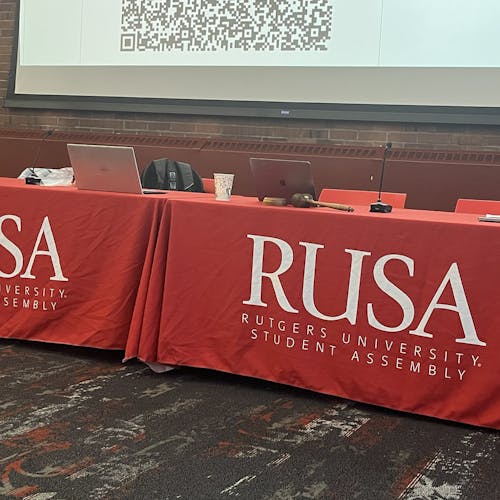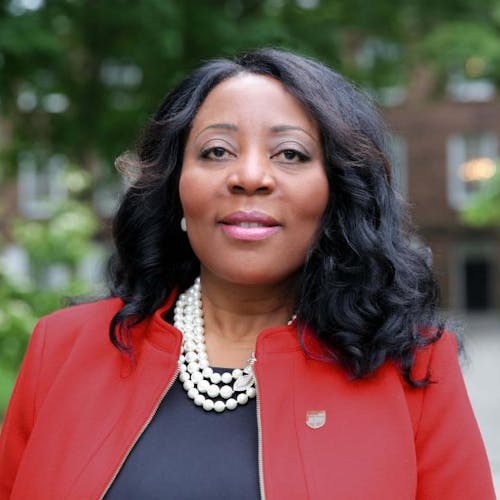41st annual New Jersey Folk Festival promotes musical talent

Nearly 50 years after folk icon Bob Dylan shocked the Newport Folk Festival audience by playing with a rock band, members of the Rutgers community and beyond celebrated the growth of maritime folk culture in American music at the same time as Rutgers Day.
Thousands of Rutgers students, Garden State residents and out-of-state visitors flocked to the 41st annual New Jersey Folk Festival from 10 a.m. to 6 p.m. Saturday to enjoy a full day’s worth of music, dancing, crafts, food and recreational activities at Wood Lawn on Douglass campus.
“The New Jersey Folk Festival focuses primarily on traditional indigenous, multicultural folk forms and artists from and residing in and around New Jersey,” according to the festival website.
Even though it was not affiliated with Rutgers Day, the New Jersey Folk Festival was a “cool alternative” to the events occurring on the College Avenue, Busch and Cook campuses, said Michael Byrnes, coordinator for the festival’s "Shore Stage."
A School of Arts and Sciences senior, Byrnes was one of three judges for a competition for "Shore Stage" performers to become "Main Stage" performers at next year’s festival, he said.
Among other features, Shore Stage enjoyed old-time, bluegrass and Irish music jams to kick off the day of festivities, Byrnes said.
“I hadn’t heard about the Folk Festival until this year, and I was (eager) enough to become a part of it,” he said. “I play music myself, and this is the type of music I play.”
Being a judge was difficult because there was a prevalent need to observe all performers objectively, Byrnes said. He said he looked forward to next year’s event and plans on becoming a regular attendee.
“Running a stage was cool because I’m a performer, so I never get to manage other people,” he said. “I think (my) end result of being involved in the music world would be a management (role), where I can see talent and who would work well together.”
Folk music is important to acknowledge and appreciate because it has the power to change viewpoints, as well as initiate change, said Paul Saint John, a folk rock singer who performed at the Festival.
A Philadelphia resident, Saint John said he trekked to perform at the Shore Stage on Douglass campus last Saturday because he thought it would be the ideal location for him to expose his songs to a crowd who would enjoy them.
“My personal satisfaction is writing these songs and getting them out,” he said. “Whether it’s performing them live up and down the East Coast or getting them on the radio ... just writing them is what’s most important for me.”
In 2000, Saint John emigrated from across the pond in a town just north of Edinburgh, Scotland to live in the City of Brotherly Love and pursue his musical passion, he said.
Saint John was inspired to try writing folk songs after growing up in a setting where Scottish and Irish folk music was always playing somewhere nearby, he said.
When he moved to the United States 15 years ago, the folk rocker was pleased to see how Americana music became so prevalent and influential in American culture, Saint John said.
“It’s in our bones in Scotland and Ireland,” he said. “That’s what folk music means to me ... songs about things that are happening now, songs about things that have happened in the past, just songs that you can sit down, play and listen to.”
Folk music also has the power to make personal struggles bypass at a quicker pace, said Jane Fallon, a folk singer who performed at the Festival.
A Brookline, New Hampshire resident, Fallon said she came to the New Jersey Folk Festival after two weeks of not being able to play guitar while recovering from an intensive surgery.
A few years ago, Fallon survived a car accident, and has taken advantage of her physical recovery to play her guitar sporadically, she said. She traveled south to perform Saturday because she entered a contest at the festival and figured it would be good exposure.
“I loved (performing) at it,” Fallon said. “(There’s) a wonderful vibe — people listening in the audience and (being) under the tent, you can’t beat it. It’s really nice.”
Fallon grew up listening to music constantly and started writing songs since she was a “wee lass,” she said. Historically, folk music has always been there for her as a primary outlet for creative expression.
“Folk music is unique,” she said. “I think you have more of a chance to (make) art with folk music than anything else. The singer, songwriter (and) folk thing is my niche, and it’s given me a chance to travel around and meet new people.”
Almost every folk artist gives their best effort to put on an engaging performance to intimate audiences, Saint John said.
At the end of the day, just outside the "Shore Stage" near the Hickman Hall bridge, Byrnes said folk music is important for community togetherness because the genre of music caters to all aspects of the human condition.
“It’s about the people (and) the people trying to relate to the people,” he said. “(Performers are) not trying to make sales or make a profit, they’re trying to talk about and express a type of human emotion ... (and) connect to people on that deeper level.”
Dan Corey is a Rutgers Business School first-year student majoring in pre-business and journalism and media studies. He is an Associate News Editor at The Daily Targum. Follow him on Twitter @_dancorey for more stories.



